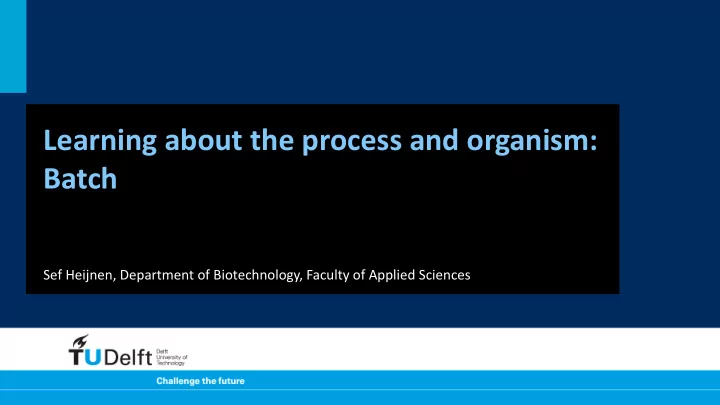

Learning about the process and organism: Batch Sef Heijnen, Department of Biotechnology, Faculty of Applied Sciences
Chemostat Batch Control over µ, q s and q p µ, q s and q p ? Volume: constant Volume: not constant
Broth balances in batch V L (t) c s (t) c x (t) c p (t) All time dependent
Batch volume changes in time c s (t) c x (t) V L (t) t t t Volume change: water evaporation, pH-titrant addition
Broth balances in batch Biomass: Substrate: Accumulation Conversion Accumulation Conversion NO STEADY STATE TIME DEPENDENT CONCENTRATIONS
In batch we look at amounts N i N s N x t t
Obtaining µ from a batch experiment: Set up the biomass balance Biomass balance: 3 variables (N X (t), t, µ (t)) UNSOLVABLE 2 variables (N X (t), t) 1 parameter (µ max ) SOLVABLE
Obtaining µ from a batch experiment: Solve the biomass balance Separating variables Setting integral and initial values INTEGRATION or: Log-linear Exponential
Obtaining µ max : Non-lineair data fitting to N x (t) N x (t)/N x (0) ln(N x (t)/N x (0)) μ max Slope = µ max t t Exponential relation Log-linear growth relation
Obtaining q s,max : solving the substrate balance Substrate balance: Biomass balance: COMBINE Setting integral and initial values INTEGRATION Consumed substrate Produced biomass
Obtaining q s,max /µ max : linear data fitting mol s consumed |(N s (t) - N s (0))| Slope = |q s,max /µ max | à | q s,max | = Slope * µ max mol x produced (N x (t) - N x (0))
Wrap up: Learning about the process and organism: Batch We have learned about the batch that: Batch broth volume seldom constant in time • Balances show: use amounts, not concentrations • Biomass balance • Biomass growth is exponential in time • Allows to calculate µ max • q s,max and q p,batch found through combi-balances • Combi-balances show that linear plots of consumed s or • produced p against produced x should be made
See you in the next unit!
Recommend
More recommend